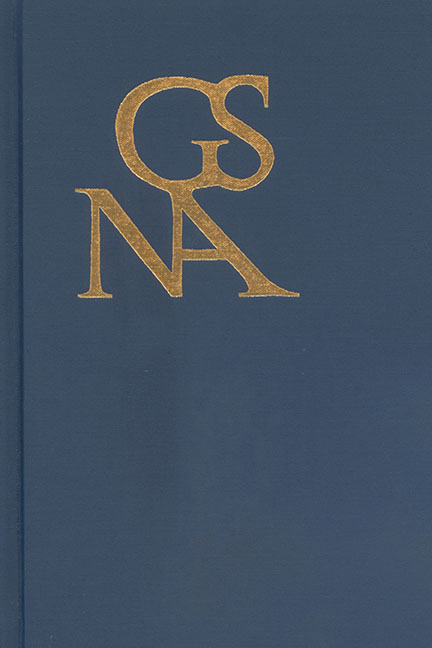Carlos Spoerhase. Das Format Der Literatur: Praktiken Materieller Textualität Zwischen 1740 Und 1830. Göttingen: Wallstein, 2018. 808 Pp., 56 Illustrations.
Published online by Cambridge University Press: 28 October 2020
Summary
The hegemony that the book supposedly enjoyed during the Goethezeit is a mirage, Carlos Spoerhase argues at the beginning of Das Format der Literatur, his particularly productive intervention into philology's renewed interest in the book as a philological object. In fact, the question of what exactly a book is was far more precarious during the era than is commonly appreciated. Indeed, the word book is often used metonymously to refer to communicative functions and pathways of intellectual transference that are strictly divorced from the inscribed or printed object that, Spoerhase argues, needs to be addressed directly. Through an analysis of neglected genres such as the Manuskript für Freunde, Spoerhase demonstrates that consideration of the “spezifische Gemachtheit von literarischer Textualität” is a valuable methodology for grasping the interconnection of textual materiality and authors’ social networks in the late eighteenth and early nineteenth centuries. The dozens of illustrations provided by Spoerhase, some of which are printed in color in an appendix, provide readers with a welcome visualization of the materiality that Spoerhase discusses.
The falling cost of print over the course of the Goethezeit allowed for the blossoming of a genre of private literary exchanges. Rather than copying out a literary work by hand multiple times—or, as was far more likely—paying a scribe to do so, authors were instead able to print small runs of works in progress that they could then circulate among their compatriots in the Republic of Letters. Gleim was a particularly enthusiastic proponent of this practice for his poetry. The texts that he distributed to fellow authors were not intended to enter into the wider market economy and thereby become subject to the instruments of literary critique that dominated that realm. Instead, as Spoerhase observes, they were intended to support the “Aufrechterhaltung und Ausweitung eines Freundschaftsnetzwerks.” A literary text's inclusion in this economy of gift giving could also function as a way to workshop the text for eventual publication. Lavater encouraged the recipients of his writing to send him their suggestions for emendation. To emphasize the work-in-progress quality of these manuscripts for friends, Lavater even printed some of them in a typeface that looked like handwriting. Philosophers such as Fichte and Schelling also availed themselves of this practice to solicit feedback rather than endure the pangs of criticism.
- Type
- Chapter
- Information
- Goethe Yearbook 27 , pp. 380 - 381Publisher: Boydell & BrewerPrint publication year: 2020



